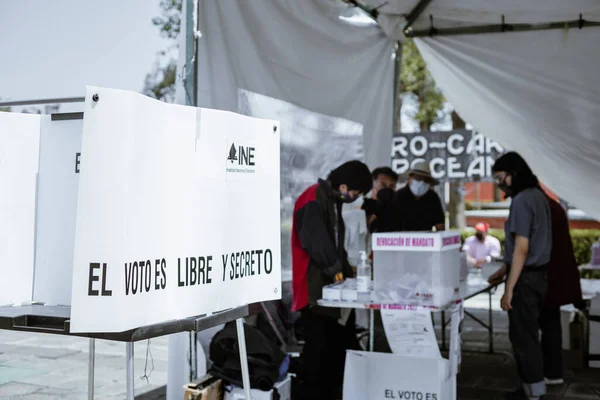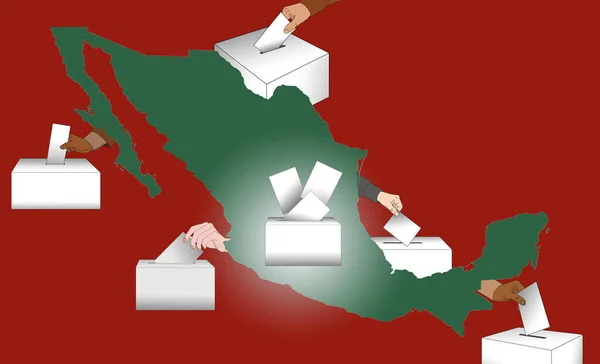"Lenguaje de las Urnas" / "Language of the Ballot Box" 5 minutes of Spanish - English version + Podcast
 |
| Una casilla / One polling station and the ballot box |
Hola! ¿Qué tal? Buenos días, buenas tardes o buenas noches según el lugar en donde estés o la hora en la que nos escuches.
Hello! How are you? Good morning, good afternoon, or good evening, depending on where you are or the time you're listening to us.
Bienvenidos a este podcast para estudiantes de español para extranjeros y muchas gracias por estar aquí.
Welcome to this podcast for Spanish learners and thank you very much for being here.
Hoy es un podcast muy especial porque llegamos a nuestra edición número 200 (doscientos).
Today is a very special podcast because we have reached our 200th edition.
Felicitaciones a ti que nos escuchaste doscientas veces.
Congratulations to you who listened to us two hundred times.
Doscientas ediciones de 5 minutos en más de doscientos podcasts, algunos no los numeramos.
Two hundred editions of 5 minutes in more than two hundred podcasts, some of which we did not number.
Con un nombre femenino decimos doscientas, con uno masculino doscientos.
With a feminine noun we say doscientas, with a masculine one doscientos.
¡Vamos al podcast doscientos!, estamos en una semana muy especial para México pues el domingo tenemos elecciones.
Let's go to the 200th podcast! We are in a very special week for Mexico because we have elections on Sunday.
¡Ay! No vamos a hablar de política, ¿verdad?
Oh! We are not going to talk about politics, right?
No, vamos a comentar las palabras que se escuchan estos días en México.
No, we are going to discuss the words that are heard these days in Mexico.
Es muy importante para el país, ya que se elegirán varios cargos o posiciones importantes.
It is very important for the country, as several important positions will be elected.
¿Cuándo son las elecciones?
- When are the elections?
El domingo 2 de junio de este año, 2024.On Sunday, June 2nd of this year, 2024.
¿Qué se vota?
What is being voted on?
Los ciudadanos mexicanos votaremos para elegir al nuevo presidente, senadores, diputados, varios gobernadores y alcaldes.
Mexican citizens will vote to elect the new president, senators, deputies, several governors, and mayors.
- Who organizes the election?
¿Quién organiza la elección?
El Instituto Nacional Electoral (INE) es el organismo responsable de organizar y supervisar todo el proceso electoral para asegurar que sea justo y transparente.
- The National Electoral Institute (INE) is the organization responsible for organizing and supervising the entire electoral process to ensure it is fair and transparent.
¿Cuántas personas pueden votar?
- How many people can vote?
El padrón electoral de 2024 supera los 100 millones de votantes en México, los jóvenes de 18 a 29 años son la mayoría de los votantes.
- The 2024 voter registry exceeds 100 million voters in Mexico, with young people aged 18 to 29 being the majority of voters.
Un poquito de
vocabulario
Elegirán - Will
elect
Cargos - Positions
Ciudadanos - Citizens
Senadores - Senators
Diputados - Deputies
Gobernadores - Governors
Alcaldes - Mayors
Elección - Election
Supervisar - To
supervise
Asegurar - To ensure
Justo - Fair
Transparente - Transparent
- How is the electoral campaign? Are there many candidates?
¿Qué tal la campaña electoral? ¿Hay muchos candidatos?
Sí, de diferentes partidos políticos. Han estado en campaña durante varios meses, presentando sus propuestas y participando en debates.
- Yes, from different political parties. They have been campaigning for several months, presenting their proposals and participating in debates.
Si recuerdas en uno de los podcasts hablamos de la palabra debate.
- If you remember, in one of the podcasts we talked about the word debate.
2 mujeres son las candidatas con más posibilidades de ganar. O sea; México va a tener su primera mujer presidente.
¿Cómo se mide la intención de voto de los ciudadanos?
- How is the citizens' voting intention measured?
Con las encuestas, ¡hay muchas encuestas y mucha propaganda!
- With polls, there are many polls and a lot of propaganda!
Campaña electoral - Electoral campaign
Propuestas - Proposals
Debates - Debates
Ganar - To win
Primera mujer presidente - First woman president
Encuestas – Polls




Comentarios
Publicar un comentario